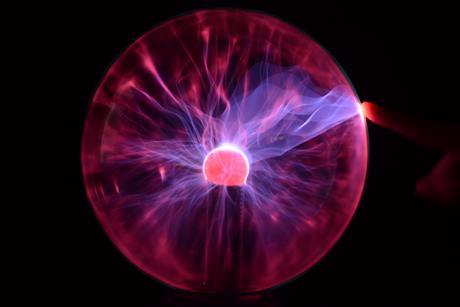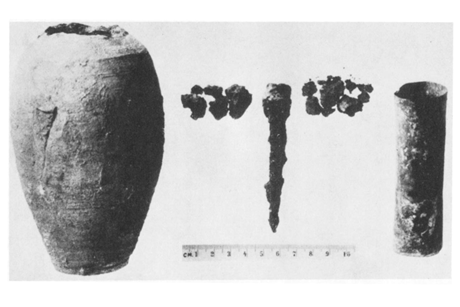Latest
Research
The quest to understand where atoms end
Atomic size measurements like van der Waals and covalent radii are central to chemistry, but are they grounded in reality?
Feature
Unravelling the chemistry behind the sea’s bioluminescent sparkle
Researchers are piecing together the unusual chemical reactions that enable dinoflagellates to create spectacular light displays in tropical bays. But the mechanism behind their bioluminescence remains one of nature’s most puzzling chemical mysteries
Feature
Unlocking the power of plasma for chemistry
Scientists are using non-thermal plasma to produce fertiliser and long-chain hydrocarbons. Mason Wakley talks to the chemists harnessing the fourth state of matter
Research
Was the ‘Baghdad battery’ really two cells?
A new study suggests it had an ‘outer’ cell that reacted with air to supply a higher voltage. But was it a battery at all?
Research
Atomic physics gets its own ‘periodic table’ that covers highly charged ions
New table could help with the redefinition of the second and creation of the next generation of atomic clocks
Opinion
To PhD or not to PhD? That is the question
Undergraduate student Umaymah Ahmad finds out what it’s like to go into academic research
The quest to understand where atoms end
Atomic size measurements like van der Waals and covalent radii are central to chemistry, but are they grounded in reality?
Benzylated backbone behind bulkiest N-heterocyclic carbene yet
System overtakes earlier record holders and shows how it can stabilise gallium and lithium in rare quasi-monocoordinated complexes
Series of stable nitrogen radical chains synthesised
Unruly [1,2]-Wittig reaction tamed to produce products with precise stereochemistry
Rising carbon dioxide levels leave conifer forests struggling to get enough nitrogen
Heat waves that push up atmospheric nanoparticle levels might explain higher death tolls
Mixed-material microrobots created from 3D-printed templates
Engineered enzymes could boost amide bond-forming efficiency for drug synthesis
Gluten-based vegan leather gains strength with heat and UV treatment
Anticipating disruption: governing emerging chemistry-driven technologies in India
How to enable innovation ecosystems
Accelerating decarbonisation for India’s cement industry
Achieving net zero by 2070 demands improvements in how cement is produced and used, as well as carbon capture technologies
AAAS annual meeting & plasma chemistry
Explainer: Why is the US eliminating synthetic food dyes?
Is that a fact, or your opinion?
Taking the sting out of pain: how marine venoms can be used to heal
Moderna’s vaccine regulatory hokey-cokey
High‑throughput retrosynthesis for real‑world chemistry
EU adds hefty anti-dumping duties to 1,4-butanediol
Letters: March 2026
Readers discuss the long-lasting effects of sabotage, a mix-up of Maxes, and how PFAS regulations might affect inhalers
Harrison’s bimetallic strip and the problems with temperature control
Making thermostats possible – now we need to learn how to use them correctly
Is that a fact, or your opinion?
When experts are sidelined or undermined, the truth needs all the allies it can get
Chemistry has always been women’s business
Female chemists played essential roles in developing chemical practice
As a first-generation student, I didn’t have a clue what I was doing
And that brought challenges and unexpected opportunites
Moderna’s vaccine regulatory hokey-cokey
US FDA initially refused to accept flu vaccine for review, but has since reversed that decision
Veronica Vaida: ‘Some Harvard faculty expressed puzzlement at having a woman colleague’
The renowned physical chemist and environmental scientist on growing up in Romania and forging her career as a woman in the US in the 1970s
How to grow an enormous single crystal
Top tips from David Boyce and his class, who have cultivated a 3kg single copper sulfate crystal
Taking the sting out of pain: how marine venoms can be used to heal
Join us on 24 April to learn how marine venoms are being used to treat chronic pain
High‑throughput retrosynthesis for real‑world chemistry
Join us on 24 March to discover how retrosynthesis software, paired with application programming interfaces, can accelerate route design, virtual screening and practical synthesis decisions
Textiles in the age of sustainability: alternative methods for fabric dyeing and treatment
Learn about advances in sustainability of textile production – join us on 31 March
From bean to brew: the chemistry behind the perfect cup of coffee
Discover the chemistry behind the aromas and flavours of one of the world’s favourite beverages
Opinion
Letters: March 2026
Readers discuss the long-lasting effects of sabotage, a mix-up of Maxes, and how PFAS regulations might affect inhalers
News
Record-breaking chemistry experiments: from giant crystals to lemon batteries
School science staples that have set Guinness World Records
Opinion
Harrison’s bimetallic strip and the problems with temperature control
Making thermostats possible – now we need to learn how to use them correctly
Careers
Finding a home in the workshop
Departmental workshops provide support for researchers in more ways than one
News
National scientific organisations consistently underrepresent women within their membership
Change is happening slowly but institutional processes continue to stymie the progression of women
Sponsored
Biphenyl: 20 years of Restek innovation
How Restek’s Biphenyl column changed chromatography
Explainer: the Welch Award in Chemistry
Many people have never heard about one of the biggest awards in chemistry. Chemistry World sets the record straight.
Optimising method transfer in regulated environments
Learn how to minimise risk and promote data quality with data-driven approaches and digital tools
SYNTHIA for chemists: faster route design
Discover how SYNTHIA accelerates retrosynthesis by helping chemists design, compare and refine routes with customisable filters and commercial building blocks
Developing a CITK protein degrader using the QuicTPD™ platform
Learn about the latest technology to accelerate the design of cancer treatments
Lab Innovations 2025 returns to shape the future of laboratories
Scientists, researchers, engineers, industry leaders and innovators gather for UK’s must-attend industry event
X-Pulse 90: expanding the capabilities of benchtop NMR spectroscopy
Learn how X-Pulse 90 is delivering a step change in benchtop NMR by providing flexibility without compromising performance
Why understanding our foraging instinct is the key to using statistical tools
Your inner hunter-gatherer is stopping you solving problems
Finding a home in the workshop
Departmental workshops provide support for researchers in more ways than one
National scientific organisations consistently underrepresent women within their membership
Change is happening slowly but institutional processes continue to stymie the progression of women
As a first-generation student, I didn’t have a clue what I was doing
And that brought challenges and unexpected opportunites
The need for science diplomacy in a fragmenting world
After receiving a US science diplomacy prize, Chemistry World talks to Martyn Poliakoff and Richard Catlow about global scientific challenges, their love of technicians and being astounded by children’s questions
Veronica Vaida: ‘Some Harvard faculty expressed puzzlement at having a woman colleague’
Is work polygamy a new trend or the daily norm for researchers?
How bird photography made me a better chemist
Dow to cut 4500 jobs in productivity drive
The chemistry of mentorship
The summer I became a science journalist




































